Anonymous feedback is a catalyst for honesty, providing a shield for individuals to share insights, concerns, and suggestions without fear of repercussion.
From fostering transparency in the workplace to enhancing educational environments, discover how embracing anonymity can elevate the quality and authenticity of feedback.
Table of Contents
How to get anonymous feedback
The best way to gather anonymous feedback is to choose a tool which ensures responses are anonymous by default. This means they also aren’t collecting any personal data behind the scenes, they may be exported along with your feedback.
If you’re already locked into a platform, you’ll want to learn how you can create anonymous surveys. This can consist of disabling tracking settings, removing questions that collect personal data, and randomizing response order.
6 Tools for collecting anonymous feedback
Not only have we collated the 6 best tools anonymous feedback tools, we’ve also provided steps to ensuring your feedback is anonymous with each:
1. FreeOnlineSurveys
Whether you want to create surveys, quizzes, or forms, FreeOnlineSurveys is a user-friendly platform for doing so at no cost to you. It offers customizable survey designs, over 20 question types, supports anonymous responses, and provides powerful reporting tools, all as part of their Free Plan.
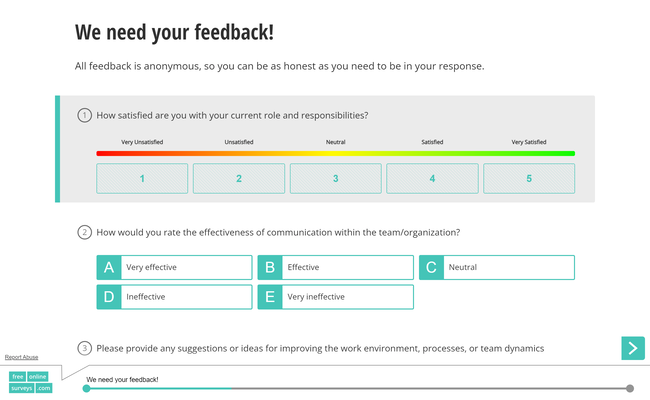
How to collect anonymous feedback with FreeOnlineSurveys
You don’t need to take any steps to collect anonymous feedback with FreeOnlineSurveys, as all responses are anonymous by default.
Bonus: No IP addresses are stored by FreeOnlineSurveys, so you can ensure you’re full compliant if required.
2. Shout.com
Shout is a growing platform for collecting feedback, generating leads, and engaging audiences. They pride themselves on their tools being as compliant as possible, offering extensive customization options, providing specific question types like NPS.
Collecting honest feedback can’t be any easier than with a tool that was built with privacy in mind.
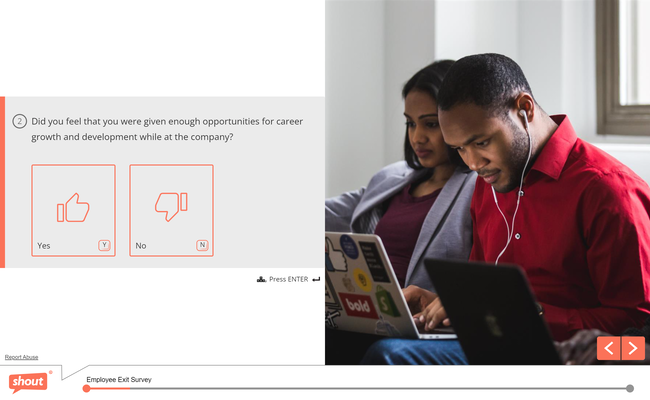
How to collect anonymous feedback with Shout
With Shout, your survey, quizzes, forms, and calculators are configured to collect anonymous feedback automatically.
Bonus: Shout offers a unique Pseudonymization feature, which allows you to track respondents whilst ensuring their responses are still anonymous.
For example, you could create a feedback form that collects customer names to make your sales team aware they’ve gotten in touch.
With Pseudonymization enabled, you can store that personal information separately to the response data, to ensure their feedback is still anonymous.
3. SurveyMonkey
SurveyMonkey is one of the most well known survey tools on the market, and they support a wide variety of features for businesses. One huge bonus of survey monkey is the sheer number of survey templates they provide.
However, if you’re looking to get anonymous feedback at a low cost (or for free), you may find their Free Plan somewhat limiting.
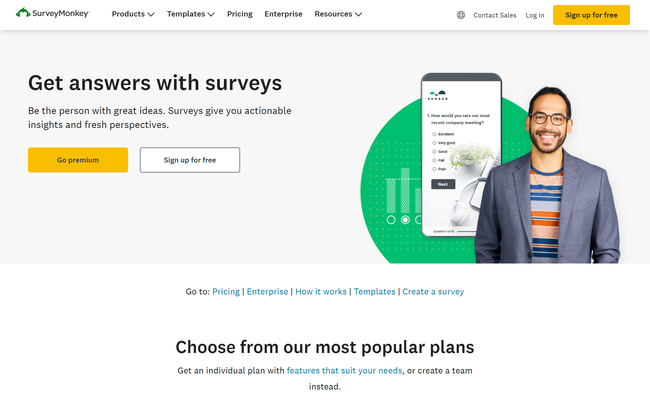
How to collect anonymous responses with SurveyMonkey
You will need to enable Anonymous Responses for each collector you use to gather responses, of which there are a few. But to enable anonymous responses for the web link collector:
- Go to Collect Responses.
- Click the collector name.
- Switch Anonymous Responses to ON.
We’d recommend checking how to enable anonymous responses for each of their collectors.
If you miss one, you may end up in a tricky situation.
4. Google Forms
Google Forms is a widely used, but fairly basic tool for collecting feedback. You can create forms, quizzes and polls, and you’ll have access to some industry-standard question types (such as multiple-choice).
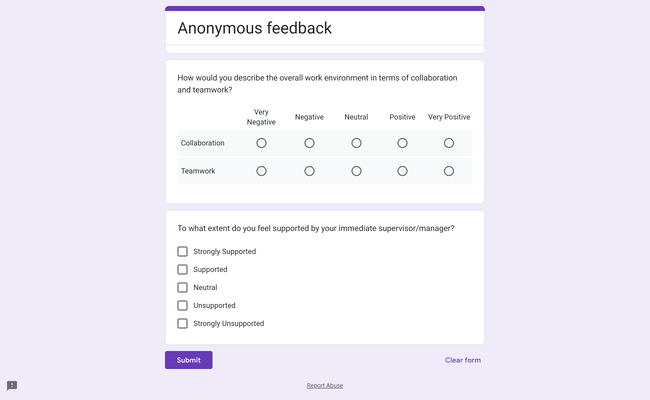
The issue with Google Forms is that their customization options can leave you wanting. So, whilst you can collect anonymous feedback, you don’t have a lot of control over how your form looks.
How to collect anonymous feedback with Google Forms
Similarly to SurveyMonkey, Google Forms will actually track your respondents by default. To make your survey anonymous:
- Go to the Settings tab
- Under “Responses”, unchecked “Collect email addresses”
It’s useful to have this feature, but again can cause issues if you don’t go digging for this setting.
5. Typeform
Typeform is an interactive survey and feedback tool renowned for its user-friendly and engaging interface. With a conversational form design, it facilitates anonymous responses and integrates seamlessly with other applications like Google Sheets and Slack.
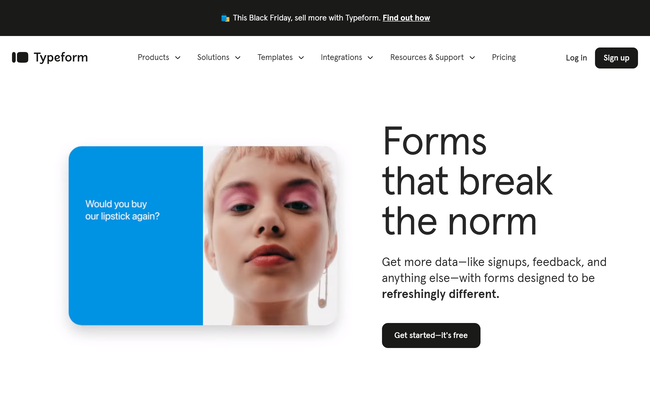
How to collect anonymous feedback with Typform
Unlike the two above feedback tools, Typeform doesn’t collect respondent data by default. So, any surveys you create with them will be anonymous without you having to enable a specific setting.
6. Poll Everywhere
Poll Everywhere is an audience engagement tool enabling real-time feedback through live polls, quizzes, and open-ended questions.
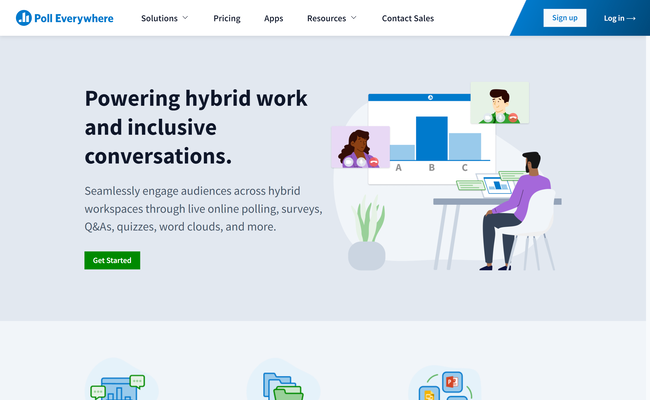
How to collect anonymous responses with Poll Everywhere
It’s important to note you will need to specify that responses should be anonymous. To do this with Poll Everywhere:
- Log into your Activities page.
- Select an Activity.
- Click Configure.
- Select Audience Restriction and Identity.
- Under “How do you want to identify participants?”, select “Completely Anonymous”.
This will ensure that any responses you collect cannot be linked to a specific respondent.
When should feedback be anonymous?
Feedback should be anonymous in situations where customers or employees might fear negative consequences for providing critical feedback.
This shouldn’t be seen as a negative, as it can actually increase participation in the feedback process.
Here are some scenarios where anonymous responses are often appropriate:
1. Employee feedback
When employees are providing feedback about their managers, colleagues, or the overall work environment, anonymity can encourage them to be more honest and open about their experiences.
2. 360-degree feedback
In a 360-degree feedback process, where an individual receives feedback from various sources, anonymous employee feedback can promote candor among team members, subordinates, and supervisors.
3. Performance reviews
When employees are asked to provide feedback on their peers’ performance, anonymity can help ensure that the feedback is based on objective observations rather than personal biases or concerns about potential fallout.
4. Customer feedback
When collecting feedback from customers, anonymous responses may encourage customers to share their genuine opinions without fear of negative repercussions.
5. Conflict resolution
When there is a need to gather feedback during conflict resolution processes, providing an anonymous channel can help individuals express their concerns without escalating tensions.
6. Sensitive feedback
In situations involving harassment, discrimination, or other sensitive matters, providing an anonymous reporting mechanism can help victims or witnesses come forward without fear of retaliation.
7. Idea generation
In organizations seeking input for innovation or improvement, anonymous suggestion boxes or platforms can encourage employees to share unconventional ideas without concerns about judgment.
Wrapping up: How to get anonymous feedback
So, let ‘s sum up everything you need to know about collecting anonymous feedback.
- Find a feedback tool that is anonymous by default
- Don’t ask for personal information (like names and email addresses)
- Enable anonymous responses (for tools that track by default)
- Randomize response order (when exporting data)
It’s important to note that while anonymity can foster honesty, it may also limit the ability to follow up or clarify feedback.
Striking a balance between anonymity and accountability is crucial. Organizations should carefully consider the context and purpose of feedback when deciding whether it should be anonymous.
